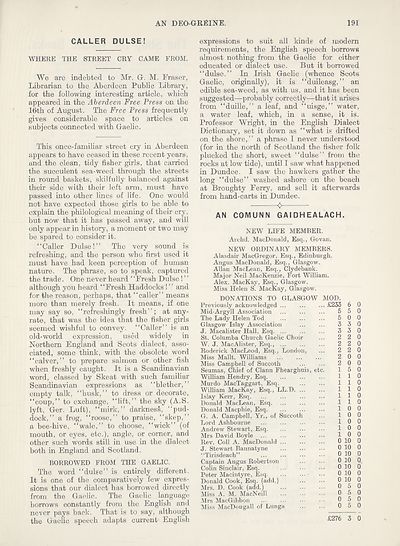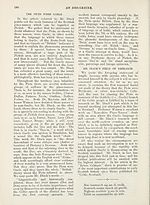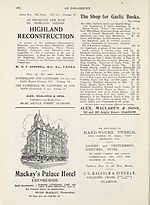An Comunn Gàidhealach Publications > Deo-gréine > Volume 16, October 1920-September 1921
(199) Page 191
Download files
Complete book:
Individual page:
Thumbnail gallery: Grid view | List view

AN DEO-GREINE.
191
CALLER DULSE!
WHERE THE STREET CRY CAME FROM.
We are indebted to Mr. G. M. Fraser,
Librarian to the Aberdeen Public Library,
for the following interesting article, which
appeared in the Aberdeen Free Press on the
16th of August. The Free Press frequently
gives considerable space to articles on
subjects connected with Gaelic.
This once-familiar street cry in Aberdeen
appears to have ceased in these recent years,
and the clean, tidy fisher girls, that carried
the succulent sea-weed through the streets
in round baskets, skilfully balanced against
their side with their left arm, must have
passed into other lines of life. One would
not have expected those girls to be able to
explain the philological meaning of their cry,
but now that it has passed away, and will
only appear in history, a moment or two may
be spared to consider it.
“Caller Dulse!” The very sound is
refreshing, and the person who first used it
must have had keen perception of human
nature. The phrase, so to speak, captured
the trade. One never heard “Fresh Dulse! ’ ’
although you heard “Fresh Haddocks ! ” and
for the reason, perhaps, that “caller” means
more than merely fresh. It means, if one
may say so, “refreshingly fresh”; at any-
rate, that was the idea that the fisher girls
seemed wishful to convey. “Caller” is an
old-world expression, used widely in
Northern England and Scots dialect, asso¬
ciated, some think, with the obsolete word
“calver,” to prepare salmon or other fish
when freshly caught. It is a Scandinavian
word, classed by Skeat with such familiar
Scandinavian expressions as “blether,”
empty talk, “busk,” to dress or decorate,
“coup,” to exchange, “lift,” the sky (A.S.
lyft, Ger. Luft), “mirk,” darknes§, “pud-
dock,” a frog, “roose,” to praise, “skep,”
a bee-hive, “wale,” to choose, “wick” (of
mouth, or eyes, etc.), angle, or comer, and
other such words still in use in the dialect
both in England and Scotland.
BORROWED FROM THE GAELIC.
The word “dulse” is entirely different.
It is one of the comparatively few expres¬
sions that our dialect has borrowed directly
from the Gaelic. The Gaelic language
borrows constantly from the English and
never pays back. That is to say, although
the Gaelic speech adapts current English
expressions to suit all kinds of modern
requirements, the English speech borrows
almost nothing from the Gaelic for either
educated or dialect use. But it borrowed
“dulse.” In Irish Gaelic (whence Scots
Gaelic, originally), it is “duileasg, ” an
edible sea-weed, as with us, and it has been
suggested—probably correctly—that it arises
from “duille, ” a leaf, and “uisge,” water,
a water leaf, which, in a sense, it is.
Professor Wright, in the English Dialect
Dictionary, set it down as “what is drifted
on the shore,” a phrase I never understood
(for in the north of Scotland the fisher folk
plucked the short, sweet “dulse” from the
rocks at low tide), until I saw what happened
in Dundee. I saw the hawkers gather the
long “dulse” washed ashore on the beach
at Droughty Ferry, and sell it afterwards
from hand-carts in Dundee.
AN COMUNN GAIDHEALACH.
NEW LIFE MEMBER.
Archd. MacDonald, Esq., Govan.
NEW ORDINARY MEMBERS.
Alasdair MacGregor, Esq., Edinburgh.
Angus MacDonald, Esq., Glasgow.
Allan MacLean, Esq., Clydebank.
Major Neil MacKenzie, Fort William.
Alex. MacKay, Esq., Glasgow.
Miss Helen S. MacKay, Glasgow.
DONATIONS TO GLASGOW MOD.
Previously acknowledged ...
Mid-Argyll Association ...
The Lady Helen Tod
Glasgow Islay Association
J. Macalister Hall, Esq. ...
St. Columba Church Gaelic Choir
W. J. MacAlister, Esq.,
Roderick MacLeod, Esq., London,
Miss Mailt. Williams
Miss Campbell of Succoth
Seumas, Chief of Clann Fheargh
William Hendry, Esq.
Murdo MacTaggart, Esq.
William MacKay, Esq., LL.D.
Islay Kerr, Esq
Donald MacLean, Esq.
Donald Macphie, Esq.
G. A. Campbell, Yr., of Succoth
Lord Ashbourne
Andrew Stewart, Esq.
Mrs David Boyle
Rev. Coll A. MacDonald ...
J. Stewart Bannatyne
“Tirisdeach”
Captain Angus Robertson
Colin Sinclair, Esq.
Peter Macintyre, Esq.
Donald Cook, Esq. (add.)
Mrs. D. Cook (add.)
Miss A. M. MacNeill
Mrs MacGibbon
Miss MacDougall of Lunga
191
CALLER DULSE!
WHERE THE STREET CRY CAME FROM.
We are indebted to Mr. G. M. Fraser,
Librarian to the Aberdeen Public Library,
for the following interesting article, which
appeared in the Aberdeen Free Press on the
16th of August. The Free Press frequently
gives considerable space to articles on
subjects connected with Gaelic.
This once-familiar street cry in Aberdeen
appears to have ceased in these recent years,
and the clean, tidy fisher girls, that carried
the succulent sea-weed through the streets
in round baskets, skilfully balanced against
their side with their left arm, must have
passed into other lines of life. One would
not have expected those girls to be able to
explain the philological meaning of their cry,
but now that it has passed away, and will
only appear in history, a moment or two may
be spared to consider it.
“Caller Dulse!” The very sound is
refreshing, and the person who first used it
must have had keen perception of human
nature. The phrase, so to speak, captured
the trade. One never heard “Fresh Dulse! ’ ’
although you heard “Fresh Haddocks ! ” and
for the reason, perhaps, that “caller” means
more than merely fresh. It means, if one
may say so, “refreshingly fresh”; at any-
rate, that was the idea that the fisher girls
seemed wishful to convey. “Caller” is an
old-world expression, used widely in
Northern England and Scots dialect, asso¬
ciated, some think, with the obsolete word
“calver,” to prepare salmon or other fish
when freshly caught. It is a Scandinavian
word, classed by Skeat with such familiar
Scandinavian expressions as “blether,”
empty talk, “busk,” to dress or decorate,
“coup,” to exchange, “lift,” the sky (A.S.
lyft, Ger. Luft), “mirk,” darknes§, “pud-
dock,” a frog, “roose,” to praise, “skep,”
a bee-hive, “wale,” to choose, “wick” (of
mouth, or eyes, etc.), angle, or comer, and
other such words still in use in the dialect
both in England and Scotland.
BORROWED FROM THE GAELIC.
The word “dulse” is entirely different.
It is one of the comparatively few expres¬
sions that our dialect has borrowed directly
from the Gaelic. The Gaelic language
borrows constantly from the English and
never pays back. That is to say, although
the Gaelic speech adapts current English
expressions to suit all kinds of modern
requirements, the English speech borrows
almost nothing from the Gaelic for either
educated or dialect use. But it borrowed
“dulse.” In Irish Gaelic (whence Scots
Gaelic, originally), it is “duileasg, ” an
edible sea-weed, as with us, and it has been
suggested—probably correctly—that it arises
from “duille, ” a leaf, and “uisge,” water,
a water leaf, which, in a sense, it is.
Professor Wright, in the English Dialect
Dictionary, set it down as “what is drifted
on the shore,” a phrase I never understood
(for in the north of Scotland the fisher folk
plucked the short, sweet “dulse” from the
rocks at low tide), until I saw what happened
in Dundee. I saw the hawkers gather the
long “dulse” washed ashore on the beach
at Droughty Ferry, and sell it afterwards
from hand-carts in Dundee.
AN COMUNN GAIDHEALACH.
NEW LIFE MEMBER.
Archd. MacDonald, Esq., Govan.
NEW ORDINARY MEMBERS.
Alasdair MacGregor, Esq., Edinburgh.
Angus MacDonald, Esq., Glasgow.
Allan MacLean, Esq., Clydebank.
Major Neil MacKenzie, Fort William.
Alex. MacKay, Esq., Glasgow.
Miss Helen S. MacKay, Glasgow.
DONATIONS TO GLASGOW MOD.
Previously acknowledged ...
Mid-Argyll Association ...
The Lady Helen Tod
Glasgow Islay Association
J. Macalister Hall, Esq. ...
St. Columba Church Gaelic Choir
W. J. MacAlister, Esq.,
Roderick MacLeod, Esq., London,
Miss Mailt. Williams
Miss Campbell of Succoth
Seumas, Chief of Clann Fheargh
William Hendry, Esq.
Murdo MacTaggart, Esq.
William MacKay, Esq., LL.D.
Islay Kerr, Esq
Donald MacLean, Esq.
Donald Macphie, Esq.
G. A. Campbell, Yr., of Succoth
Lord Ashbourne
Andrew Stewart, Esq.
Mrs David Boyle
Rev. Coll A. MacDonald ...
J. Stewart Bannatyne
“Tirisdeach”
Captain Angus Robertson
Colin Sinclair, Esq.
Peter Macintyre, Esq.
Donald Cook, Esq. (add.)
Mrs. D. Cook (add.)
Miss A. M. MacNeill
Mrs MacGibbon
Miss MacDougall of Lunga
Set display mode to:
![]() Universal Viewer |
Universal Viewer | ![]() Mirador |
Large image | Transcription
Mirador |
Large image | Transcription
| An Comunn Gàidhealach > An Comunn Gàidhealach Publications > Deo-gréine > Volume 16, October 1920-September 1921 > (199) Page 191 |
|---|
| Permanent URL | https://digital.nls.uk/125656375 |
|---|
| Description | Leabhar 16, Mìos Deireannach an Fhogharaidh 1920 gu Darna Mìos an Fhoghair 1921 |
|---|---|
| Attribution and copyright: |
|
| Description | This contains items published by An Comunn, which are not specifically Mòd-related. It includes journals, annual reports and corporate documents, policy statements, educational resources and published plays and literature. It is arranged alphabetically by title. |
|---|
| Description | A collection of over 400 items published by An Comunn Gàidhealach, the organisation which promotes Gaelic language and culture and organises the Royal National Mòd. Dating from 1891 up to the present day, the collection includes journals and newspapers, annual reports, educational materials, national Mòd programmes, published Mòd literature and music. |
|---|---|
| Additional NLS resources: |
|

